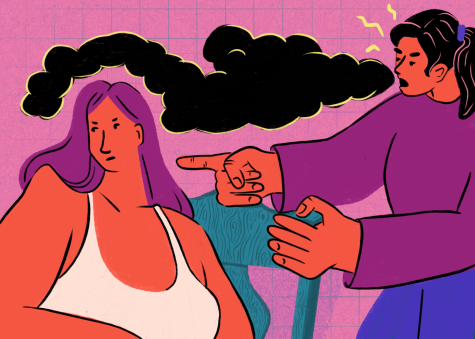Awkward: Navigating your way through a toxic relationship—being in one or getting out
April 14, 2021

This is the third time in five weeks you’ve stormed out of a restaurant because you thought your mom was going to be nice to you today. Then, she wasn’t.
Each time, she apologizes and tells you she loves you and you shouldn’t take everything she says so seriously, and each time, you say you guess it’s okay, and you make plans to catch up over lattes.
But this time, as you stomp to the bus to get back home, you wonder how much longer you can keep doing this. It’s emotionally exhausting to have to forgive someone and then put energy back into your relationship, only to trash it when the situation gets bad again.
What should you do if you think you might be in a toxic relationship? The Chronicle spoke with mental health and relationship experts to find out.
Start off with weighing the pros and cons of the relationship, said psychologist and friendship expert Irene S. Levine. Specifically, about potentially toxic friendships, she said these relationships are built up over time, so you do not want to immediately disregard the person. But the relationship should feel good for all parties, so you should respect yourself as well.
“Friendships are voluntary relationships, and they should be rewarding,” she said. “If they’re not, it may be time to end the friendship, but you have to bear in mind that this person was your friend, so you want to do it in as kind a way as possible.”
Hollie Schmid, marriage and family therapist at Relationship Reality 312, said some of the steps you should take in a situation like this depend on if the other person is a friend, family member or a romantic partner. But in any case, she would recommend vocalizing your feelings using statements like “I feel x, y and z” instead of “You did x,” which make the receiver defensive.
She said there are levels to toxicity. If the toxicity involves manipulation, gaslighting or emotional abuse, Schmid recommends going to therapy for further help if the toxic person is a family member or romantic partner. Having an unbiased person speak to your partner or family member about their behavior is the best route, but if they are not willing to change or seek help, having therapy to help yourself will be beneficial.
If the level of toxicity involves physical abuse, individual therapy would be more appropriate than relationship therapy, said Jennifer Litner, sexologist and director of Embrace Sexual Wellness.
She said to identify how safe you feel. Think about the repercussions of leaving, and use that knowledge as you create a safety plan and support system for getting out of the relationship.
Identifying when it is time to leave can be difficult. Lizzette Arcos, a psychotherapist at Youth & Family Counseling, said to think about it metaphorically—how much fast food can you eat before you start to feel sick? You should have a healthy balance between fast food and vegetables, just as you should have a healthy balance between traits of a person that make you upset and traits that make you happy.
“If you weigh the pros and cons of what they bring to the relationship and what you bring, you can see their toxicity,” Arcos said.
Catalina Lawsin, Ph.D, a clinical health psychologist specializing in sex and relationships at her private practice, advises to be wary of only using “toxic” to describe your relationship.
It is a subjective descriptor, she said, that could describe someone who is undergoing physical abuse every hour of the day or someone whose partner comments on their appearance whenever they go to dinner.
“The more we can specify and localize a problem or concern, the easier it is to manage,” Lawsin said. “I do think if that’s how someone is describing their relationship or their experience, then delve deeper into what that is.”







